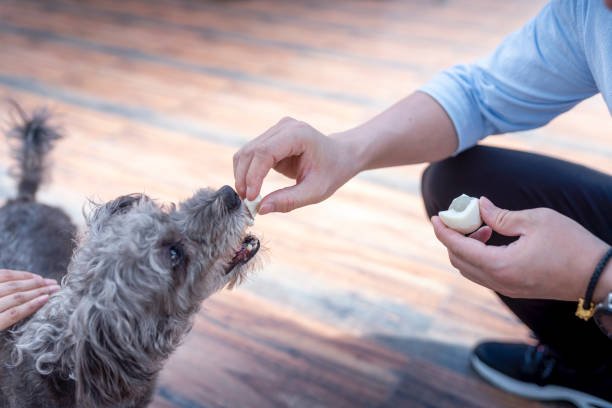Can Dogs Eat Eggs? Have you ever wondered if your canine companion can indulge in the same breakfast delight that you enjoy every morning? Picture this: you’re sitting at the breakfast table, relishing a plate of freshly cooked eggs. Your dog, with those innocent eyes, stares at you, possibly hoping for a share of your meal. You might find yourself wondering, “Can dogs eat eggs?”

Table of Contents
Engaging Curiosity
Dogs are not just pets; they are integral members of our families. We want to ensure that they are not only happy but also healthy. However, with an abundance of human foods available, it becomes crucial to discern what is safe for our furry friends. Eggs, for instance, are a staple in many households worldwide. They are a powerhouse of nutrients for humans, providing an excellent source of protein and other essential elements. But what about our pets? Can they partake in this nutritious delight without any harm?
Understanding the Importance
Recognizing the significance of understanding our canine companions’ dietary needs is paramount. Dogs, much like humans, have specific dietary requirements crucial for their overall well-being. Feeding them the wrong food can lead to various health issues. Therefore, it’s essential to be well-informed about what our dogs can and cannot consume.
Why It Matters
Understanding the compatibility of eggs with a dog’s digestive system is more than just a matter of curiosity. It’s about ensuring the safety and well-being of our beloved pets. The information provided here is not just a guide; it’s a responsible approach to pet ownership. By the end of this article, you will have a comprehensive understanding of whether eggs can be a part of your dog’s diet and, if so, how to incorporate them safely.
Now, let’s embark on this informative journey, uncovering the mysteries surrounding dogs and their consumption of eggs. Let’s ensure that our furry companions not only wag their tails with joy but also enjoy a healthy and balanced diet tailored to their unique needs.
Eggs, the breakfast staple loved by many, might have found their way into your dog’s curious gaze. The good news is, eggs are not toxic or dangerous to dogs. In fact, some dogs may even relish the delightful taste of this protein-packed food. But before you start sharing your scrambled eggs with your four-legged friend, let’s take a closer look at the nutritional aspects.
Nutrition Facts of Eggs
Let’s break down the nutrition facts of eggs, showcasing why they are considered a nutritional powerhouse for both humans and dogs alike. Below is a detailed table outlining the nutritional content of eggs:
| Nutrient | Amount per 100g |
|---|---|
| Calories | 78 kcal |
| Protein | 5g |
| Fat | 1.6g |
| Carbohydrates | 0.6g |
| Dietary Fiber | 0g |
| Sugars | 0.5g |
| Calcium | 0.2mg |
| Iron | 0.9mg |
| Vitamin A | 244 IU |
| Vitamin D | 44 IU |
| Vitamin B12 | 0.6mcg |
| Folate | 23.5mcg |
Nutritional Benefits for Dogs
Eggs are a rich source of various nutrients that can benefit our canine companions. They contain high-quality proteins essential for muscle development and repair. Moreover, eggs are packed with vitamins such as Vitamin A, vital for vision health, and Vitamin D, necessary for bone growth and overall immune system support. Additionally, eggs provide minerals like iron, crucial for oxygen transportation in the body, and calcium, essential for healthy bones and teeth.
Drawbacks and Precautions
While eggs offer significant nutritional benefits, there are certain drawbacks and precautions to keep in mind. One of the potential concerns is the cholesterol content in eggs, which might be worrisome for dogs with existing heart conditions. Excessive consumption might lead to obesity and other related health issues.
Furthermore, there’s the risk of salmonella contamination in raw or undercooked eggs, posing a threat not just to dogs but humans too. It’s crucial to ensure that eggs are thoroughly cooked before feeding them to your furry friend.
A Complementary Addition to the Diet
It’s important to note that while eggs can be a nutritious addition to your dog’s diet, they should complement, not replace, the primary dog food. A balanced commercial dog food is formulated to meet all the nutritional requirements of your pet. Eggs should be given as an occasional treat or supplement rather than a staple.
Understanding the delicate balance of incorporating eggs into your dog’s diet is key to reaping the benefits without causing any harm. Now that we’ve examined the nutritional aspects, in the following sections, we will explore how much is too much, potential allergies, and what to do if your dog consumes parts of eggs that are not suitable for them. Let’s ensure your beloved pet enjoys the goodness of eggs safely and responsibly.
How Much Eggs Can a Dog Eat?
When it comes to sharing your breakfast bounty with your furry friend, moderation is the key to ensuring their well-being. Treats, including eggs, should never constitute more than a certain percentage of your dog’s daily calorie intake. While the exact quantity varies depending on your dog’s size, age, and overall health, it’s crucial to strike a balance between indulgence and nutritional prudence.
Starting Small and Observing Reactions
Before your dog becomes a full-fledged egg enthusiast, it’s wise to start with a small piece. Observe how your dog reacts to this new addition to their diet. Like humans, dogs can have individual preferences and tolerances. Some might relish the taste instantly, while others might need a little time to warm up to the idea.
Proper Preparation Matters
Now, how you prepare eggs for your dog is just as important as the quantity. While a plain boiled or scrambled egg without any additives is generally safe, it’s crucial to avoid using any seasonings, especially salt. Dogs have a much lower tolerance for salt than humans, and excessive sodium intake can lead to serious health issues.
Consider Your Dog’s Size and Breed
The size and breed of your dog play a significant role in determining how much eggs they can tolerate. Larger dogs may be able to consume more eggs without any adverse effects compared to their smaller counterparts. It’s essential to factor in your dog’s weight and breed characteristics when determining the appropriate serving size.
Appropriate Serving Sizes Based on Weight
Here’s a general guideline for serving sizes based on your dog’s weight:
- Small Dogs (Up to 20 lbs): Half to one small scrambled or boiled egg a few times a week.
- Medium Dogs (20-50 lbs): One medium-sized scrambled or boiled egg a few times a week.
- Large Dogs (50-100 lbs): One to two medium-sized scrambled or boiled eggs a few times a week.
- Giant Dogs (100+ lbs): Two to three medium-sized scrambled or boiled eggsa few times a week.
Remember, these are just guidelines. Every dog is unique, and their tolerance levels might vary. It’s always best to consult with your veterinarian to determine the most suitable portion size tailored to your dog’s specific needs.
By adhering to these guidelines and being mindful of your dog’s reactions and dietary needs, you can incorporate eggs into their diet sensibly. Now that we’ve covered the basics of quantity, let’s move on to an equally important aspect: potential allergies and what to do if your dog consumes parts of eggs that are not safe for them. Understanding these facets ensures that your dog enjoys eggs as a treat, fostering a healthy and happy relationship between your pet and this nutritious food source.
What Are the Risks of Feeding Eggs to Dogs?
While eggs can be a delightful addition to your dog’s diet, it’s essential to be aware of potential risks associated with their consumption. Just like humans, dogs can also develop food allergies, and eggs are no exception. Understanding the signs of intolerance and being vigilant about your dog’s reactions is crucial to ensuring their safety.
Food Allergies and Intolerance
Food allergies in dogs can manifest in various ways. Short-term signs of food intolerance, including gastrointestinal distress, are common when dogs consume eggs. Symptoms might include upset stomach, vomiting, diarrhea, or excessive gas. These signs can be distressing for both you and your pet. If you notice any of these symptoms after your dog has ingested eggs, it’s essential to consult your veterinarian promptly.
Potential Hazards in Eggs
Certain components of eggs can pose hazards to dogs. One notable concern is salmonella, a bacteria that can be present in raw or undercooked eggs. Salmonella infection can cause severe gastrointestinal distress, leading to dehydration and other complications. Always ensure that eggs are thoroughly cooked to eliminate this risk.
Additionally, avidin, a protein found in egg whites, can interfere with the absorption of biotin, a B-vitamin essential for your dog’s coat and skin health. While this is more of a concern for dogs on a long-term exclusive egg diet, it’s still worth noting.
Allergic Reactions: What to Watch Out For
When it comes to allergies, dogs might exhibit various signs, both immediate and delayed. Watch out for symptoms such as itchy skin, hives, swelling of the face or paws, difficulty breathing, or excessive scratching. If you notice any of these signs after your dog has consumed eggs, it’s imperative to seek veterinary care immediately.
Specific Issues Caused by Consuming Eggs
Apart from allergies, there are specific issues that can arise from a dog consuming eggs. For instance, if your dog happens to ingest raw eggs, there’s a risk of contracting E. coli, another dangerous bacteria that can lead to severe gastrointestinal problems. Always ensure that eggs are cooked thoroughly to eliminate this risk entirely.
Signs and Symptoms of Adverse Reactions
Understanding the signs and symptoms of adverse reactions is paramount. If your dog exhibits any of the following signs after consuming eggs, it’s crucial to seek immediate veterinary attention:
- Difficulty breathing
- Swollen face or throat
- Excessive vomiting or diarrhea
- Lethargy or weakness
- Seizures
- Loss of consciousness
How to Feed Eggs to Your Dog and Make It More Enjoyable for Them

Feeding your dog eggs can be a delightful experience not just for you, but for your furry friend as well. There are numerous creative ways to incorporate eggs into your dog’s diet, making their meals not only nutritious but also enjoyable. Let’s explore the various methods to feed eggs to your dog and how to enhance their dining experience.
Different Ways to Feed Eggs
Eggs can be served to your dog in several ways, catering to their taste preferences and dietary needs. One of the simplest methods is to offer eggs as a fresh or frozen treat. Many dogs enjoy the cool, smooth texture of a frozen egg on a hot day, making it both a tasty and refreshing snack.
Additionally, eggs can serve as excellent food toppers or mixers. Adding a small portion of scrambled or boiled eggs to your dog’s regular food can elevate the taste and nutritional value of their meal. This method is particularly useful if your dog is a picky eater, as the aroma and flavor of eggs can entice them to finish their entire bowl.
Furthermore, eggs can be the star ingredient in homemade treats or snacks. By combining eggs with other dog-friendly ingredients like peanut butter, oats, or carrots, you can create nutritious and flavorful treats that your dog will adore. Homemade treats not only provide a special indulgence but also allow you to monitor the quality of ingredients, ensuring your dog gets the best.
Enhancing Your Dog’s Meals with Eggs
Getting creative with eggs can significantly enhance your dog’s dining experience. For example, you can create a scrambled egg puzzle by hiding small bits of scrambled egg within your dog’s regular kibble. This engages your dog mentally and physically, making mealtime a stimulating experience.

Another method is to prepare a homemade egg-based gravy. Blend cooked eggs with a bit of water or low-sodium broth to create a flavorful sauce that can be drizzled over your dog’s food. Not only does this enhance the taste, but it also adds moisture to the meal, making it more appealing, especially for dogs who are reluctant water drinkers.
Creative Homemade Treats and Snacks
Here are a few creative recipes and ideas for making homemade treats or snacks with eggs:
1. Peanut Butter and Egg Biscuits:
- Mix peanut butter, mashed bananas, eggs, and whole wheat flour.
- Shape the mixture into small biscuits and bake until golden brown.
2. Veggie Egg Muffins:
- Whisk eggs and mix them with finely chopped vegetables like carrots, spinach, and zucchini.
- Pour the mixture into muffin tins and bake until set.
- These muffins are not only delicious but also packed with vitamins and minerals.
3. Frozen Yogurt and Egg Popsicles:
- Blend plain yogurt, eggs, and a handful of blueberries.
- Pour the mixture into popsicle molds and freeze.
- These frozen treats are perfect for a refreshing snack on a hot day.
4. Egg and Oatmeal Cookies:
- Combine eggs, oats, mashed sweet potatoes, and a bit of honey.
- Form the mixture into cookie shapes and bake until firm.
- These cookies are a great source of fiber and energy.
By incorporating eggs into these creative recipes, you’re not only providing your dog with a delectable treat but also enriching their diet with wholesome nutrients.
Frequently Asked Questions About Dogs Eating Eggs
1. Can all dogs eat eggs?
Yes, in general, most dogs can safely eat eggs. However, every dog is unique, and individual reactions can vary. It’s crucial to introduce eggs gradually into your dog’s diet, monitor their reactions, and consult your veterinarian if you have concerns about specific breeds or health conditions.
2. Can puppies eat eggs?
Yes, puppies can eat eggs, and they can benefit from the high-quality proteins and essential nutrients found in eggs. However, it’s essential to consult your vet regarding the appropriate portion size and frequency, especially for very young puppies, as their digestive systems are still developing.
3. Should eggs be cooked before feeding them to dogs?
Yes, it is highly recommended to cook eggs thoroughly before feeding them to dogs. Cooking eliminates the risk of harmful bacteria like salmonella and reduces the chances of your dog contracting foodborne illnesses. Raw or undercooked eggs can pose health hazards for dogs and humans alike.
4. Can dogs eat eggshells?
While eggshells are not toxic, they are not recommended for dogs. Eggshells can be abrasive to a dog’s digestive tract and might cause irritation or minor injuries. It’s best to discard eggshells responsibly and not include them in your dog’s diet.
5. Are there any health benefits to feeding eggs to dogs?
Yes, there are several health benefits to feeding eggs to dogs. Eggs are rich in high-quality proteins, vitamins, and minerals such as vitamin A, D, B12, iron, and calcium. These nutrients support muscle development, bone health, and overall immune function in dogs.
6. Can eggs cause allergies in dogs?
Yes, dogs, like humans, can develop allergies to certain foods, including eggs. If your dog exhibits symptomslike itching, hives, swelling, or gastrointestinal distress after consuming eggs, it could be indicative of an allergic reaction. If you suspect an allergy, consult your veterinarian for further evaluation.
7. How frequently can I feed eggs to my dog?
Eggs should be fed to dogs in moderation. While they offer nutritional benefits, they should not replace a balanced diet formulated for dogs. As a treat or supplement, dogs can generally enjoy eggs a few times a week, depending on their size and dietary requirements. However, it’s crucial not to overindulge them.
8. Can dogs eat eggs if they are on a specific diet?
Dogs on specific diets, such as those for weight management or specific health conditions, can still enjoy eggs in moderation. However, it’s essential to consult your veterinarian to ensure that feeding eggs aligns with your dog’s dietary plan and health goals. Your vet can provide personalized guidance based on your dog’s unique needs.
9. Can I feed my dog eggs with other human foods?
While eggs can be a safe and nutritious addition to your dog’s diet, it’s crucial to avoid combining them with other human foods that are harmful to dogs. Foods like chocolate, grapes, onions, and garlic are toxic to dogs and should never be mixed with eggs or any other part of their diet.
10. Can eggs be used as a training treat for dogs?
Yes, eggs can be an excellent training treat for dogs, especially if your pet finds them enticing. Small pieces of cooked eggs can be a healthy and high-reward option during training sessions. However, as with any treat, moderation is key to avoid overfeeding and maintain a balanced diet.
Conclusion
In conclusion, while eggs can indeed be a part of your dog’s diet, the key lies in moderation and responsible feeding. As highlighted throughout this article, dogs can enjoy eggs in small amounts as an occasional treat. However, it’s crucial to be aware of potential risks, including allergies and digestive issues. Eggs should never replace a balanced commercial dog food and should be given sparingly, ensuring they complement your dog’s primary diet without causing harm.























